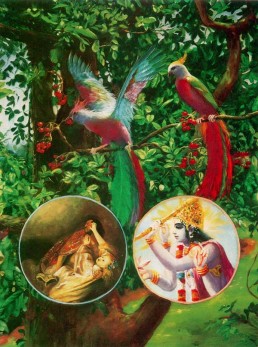Swami Chinmayananda
Swami Chinmayananda Commentary
OF THE CHASTISERS, I AM THE SCEPTRE — The ruler and the ruled must both prevail in the State, if they desire progressively to push ahead the standard of living in the various communities. The law-giver must see that he governs by enforcing the laws. In the function of the government, the governor will, of necessity, become the punisher of the unsocial members of the community, who are tempted, in their selfishness, to disobey the existing laws in the community. The ruled, in their loyalty and reverence to the existing laws, generally succumb to the punishments meted out to them by their rulers. But, in fact, who is that who really gives the powers, to the King or the President, to punish the misbehaving individuals? After all, in modern states, individuals have no right to take the law into their own hands.
The King wields the sceptre, which is the symbol of his power to punish. To the President in a democratic institution, the sanction to punish is given by the public will of the people. In the policeman at the street-corner, the power to arrest is attached to his uniform. A King devoid of his sceptre, a President who has been thrown out, or a dismissed policeman — none of them has any longer the power to chastise the wicked. Naturally, therefore, “OF ALL THOSE WHO PUNISH,” the Lord says, “I AM THE SCEPTRE.” Without the symbol of the social sanction, no individual in the community has any right over the others. After all, be he a King or a President, be he a policeman or a judge, all of them are in themselves only members of the community, but they play the part of guarding the security of the community, because of the special privileges they possess due to the status of their office.
OF CONQUERERS, I AM STATE-CRAFT — That a mere physical conquest is no victory at all, is the repeated declaration of all history text-books. No nation, community, society, or individual can, in fact, be considered as having conquered merely because of the force that has smothered their enemy, or because of the might that is standing guard over them. The conquest of a community can be complete only when the conqueror has, through intelligent administrative policies, brought the conquered to identify their culture and thought-patterns with his own. If the conquerors are not capable of converting the conquered, or getting themselves converted to the cultural values of the conquered, the conquest is never complete. This is an open secret to every student of history. After the military conquest, through statesmanship alone, can real baptism come, and this alone can bring the conquered permanently under the will of the conqueror. “I AM STATE-CRAFT” by which all conquerors are really conquerors.
OF THINGS SECRET, I AM SILENCE — Secrecy is maintained in and nourished by silence. When a secret is ventilated in open discussions, it is no longer a secret. Thus the very essence of a secret lies in silence. So too, it may be noted that the Knowledge of the Self is described in our text-books as “the secret of secrets,” because it is not generally known. This great secret is also experienced, and the divine experience is maintained and enjoyed, sustained and nourished, as well as fed and grown, only upon the deep inner silence. Of all secret things, the Lord is the deep and unbroken Silence!
THE KNOWLEDGE OF THE KNOWER AM I — The wisdom of the wise is not the wise themselves, and yet, it is not anything different from them. The Self is not the body, and yet, we cannot say that the body is anything different from the Self, which is All-pervading. The envelopments of matter and their worlds of experiences are all the aura of glory that shines out around the Self. The knowledge in the knower or the wisdom in the wise, is the expression of the Glory Divine, because of a certain pattern maintained among the inner personalities in the individuals concerned.
SUMMING UP ALL THAT HE HAD SAID SO FAR IN A BEAUTIFUL PERORATION, THE LORD SAYS:
Adi Sankara Commentary
Damayatam, of the punishers; I am dandah, the rod, which is the means of controlling the lawless. I am the nitih, righteous policy; jagisatam, of those who desire to conquer. And guhyanam, of things secret; I am verily maunam, silence. I am jnanam, knowledge; jnanavatam, of the men of knowledge.
The Bhagavad Gita with the commentary of Sri Sankaracharya – Translated by Alladi Mahadeva Sastry
Holy Geeta – Commentary by Swami Chinmayananda
The Bhagavad Gita by Eknath Easwaran – Best selling translation of the Bhagavad Gita
The Bhagavad Gita – Translation and Commentary by Swami Sivananda
Bhagavad Gita – Translation and Commentary by Bhaktivedanta Swami Prabupadha
Srimad Bhagavad Gita Chapter 10 – Verse 38 – 10.38 dando damayatamasmi – All Bhagavad Gita (Geeta) Verses in Sanskrit, English, Transliteration, Word Meaning, Translation, Audio, Shankara Bhashya, Adi Sankaracharya Commentary and Links to Videos by Swami Chinmayananda and others – 10-38

